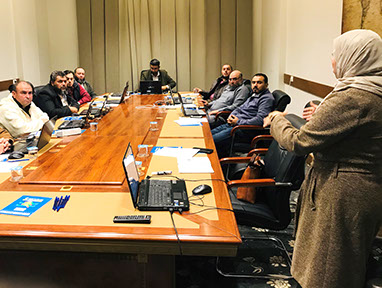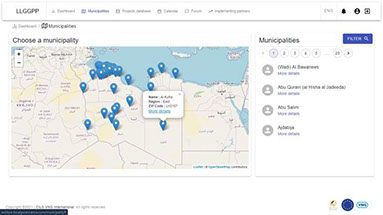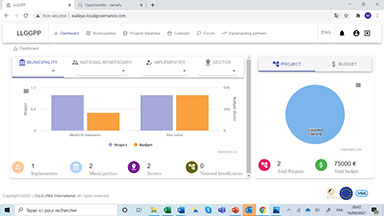Annual Update 2021 VNG International

Gender impact
It has been especially difficult to ensure female participation in our activities in the more conservative Southern municipalities. Furthermore, due to weak female representation in municipal councils, with only one seat for a female councillor in each municipal council, involvement of women has proven generally low. Yet, we continued to help the municipalities understand the benefits of an inclusive and participatory approach, and that female participation is crucial for the implementation of these pilot projects.
Successful female leadership through LLPP
The programme trained a female engineer and civil servant in charge of the GIS unit at the municipality of Souk el-Jomaa, Ms Afef Al Muntasser, to be a trainer on GIS. Then she conducted a training in the municipality of Misrata, for 11 male staff members on how to use GIS software like ArcGIS, ArcMap and databases like SQL servers, Access and more. Not only did the programme engrain the idea of colleague-to-colleague learning but it gave space to a female municipal official to be a leader in her domain of expertise. After the training, the Misrata municipality has appointed 3 women to their GIS unit.
Click here for her testimonial


improving Access to Basic Services
by strengthening democratic local government
Featured Project
Libya, Local Pilots Project
Since 2018, VNG International and the Centre International de Développement pour la Gouvernance Locale Innovante (CILG) are implementing the Libya Local Pilot Projects (LLPP) programme, funded by the European Union. The programme contributes to strengthening and empowering local governments in Libya, which have come to play an increasingly important role due to the lack of a unified central government. By aiming at improved local governance, in particular with improved local service delivery through the implementation of municipal pilot projects, LLPP seeks to contribute to stabilisation and create conditions for future reconstruction and reconciliation in Libya .
Despite the extremely challenging operational context, VNG International has been successfully carrying out activities in Libya since 2012. The focus of our work is on capacity development of local councillors, implementation of municipal pilot projects and developing the capacity of civil society and engaging citizens.
LLPP’s approach is characterised by the fact that it produces concrete and tangible results through the implementation of eight pilot projects, tailormade to the involved municipalities’ needs, while at the same time facilitating institutional strengthening and capacity development of local actors by providing trainings and workshops, as well as organizing consultation sessions and community meetings.
Results achieved:
- In Souk el-Jomaa and Misrata, we launched a Geographical Information System (GIS) center and training, helping local governments to make evidence-based decisions with the use of maps and data rather than mainly politically or socially motivated decisions. This has increased local government accountability.
- In Zawya, Abuslim, Sharguia, and Hay al-Andalus, we constructed and opened Urban Parks, creating a safe public space for citizens to come together and meet. Based on a consultative process, the urban parks are designed in a way that stimulates group activities and takes into consideration specifically women’s and children’s needs in such spaces. A significant increase in the number of women using public spaces can already be observed.
- In Brak al-Shati and Wadi Bawanis, we developed Citizen Service Offices. The Citizen Service Office, or municipal one-stop-shop, is based on three main components. We invest in the development of an online application and the training of municipal officials on how to use it. An expert designs and we construct an open space as a front office for the municipality to receive requests and complaints. We provide training on communication with citizens to the relevant municipal staff. Both citizens and municipal staff are quickly getting familiar with this new way of communicating with each other.
- Within LLPP we also developed the 2.0 version of the EU Coordination Platform and added more functionalities according to a collectively drafted Terms of References taking into consideration the different remarks and recommendations of the EU Implementers involved in development programmes in Libya.
By continuing to improve this Platform, VNG International and CILG are leading the efforts to ensure coordination and reduce the risks of duplication among the efforts of the different EU Implementers active in Libya.